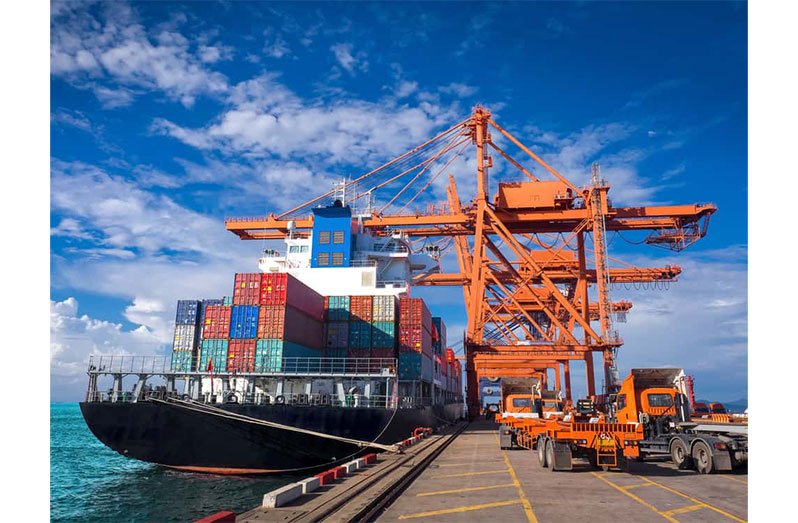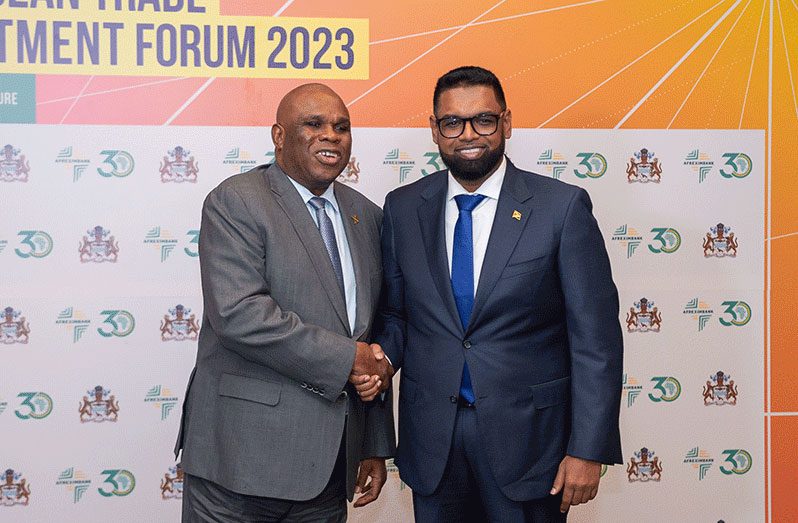–President Ali says
AS the Caribbean Community (CARICOM) looks to re-engineer its supply chain through trade, the African Export-Import Bank (Afreximbank) has signalled its intention to support the Region in its efforts to enhance its transport infrastructure.
This was revealed by President, Dr. Irfaan Ali at the recently held AfriCaribbean Trade and Investment Forum held here in Guyana.
The President said although the financial institution is willing to support the Region in those efforts, the regional private sector needs to do more to support governments.
“We can plant and grow as much as we want. We can do agro-processing, manufacturing, and industrial development. We can re-engineer the supply chain, but we have to move things. We have to move things throughout the Region,” Dr. Ali said.
According to the President, the Afreximbank has assured the Region of its support in examining a proposal from the regional private sector to support the maritime transport infrastructure.
“Every single state in CARICOM has made it clear that we will give all the incentives necessary to facilitate the building of a regional transport infrastructure system to solve the problem of regional transport. It is in your hands now,” the Head of State said, while issuing a direct call to the private sector to form consortiums.

He added: “We have to learn to remove the imaginary barriers between ourselves and act in a collective, in consortiums, bringing together our collective capital, our collective talent, and our collective structure, so that we can make use of the larger-scale opportunities that exist within the Region.”
Currently, CARICOM leaders are on a mission to reduce the Region’s high expenditure on food imports.
The end goal is to slash the region’s US$6+ billion food-import bill by 25 per cent by 2025.
While many countries have implemented policies and programmes to increase food production, some non-tariff barriers hinder the smooth trade of goods in the Region.
“We can’t tiptoe around this anymore. The private sector has failed us in this endeavour,” Dr. Ali said.
He added: “This is a business opportunity, not a state opportunity. This is a business opportunity that governments in the Region are ready to facilitate and support to the right incentive and fiscal system, we have made it very clear. You need now to be what you always demonstrate yourself to be, the engine of growth.”
CARICOM has already begun discussions to examine the possibility of establishing a ferry service, and maritime policy to increase trade, but President Ali maintains that more can be done by the private sector.
Afreximbank’s President and Chairman of the Board of Directors, Benedict Oramah, said the bank has already approved US$1.5 billion in funding to enable member states of CARICOM to ratify the Partnership Agreement with Afreximbank, enabling states to tap into the bank’s various financial instruments.
The financing institution, according to Oramah, is currently in the process of establishing its first regional headquarters in Barbados, where the first AfriCaribbean Trade and Investment Forum was held last year.
“Afreximbank expects to begin the process of developing the Afreximbank Africa Trade Centre in Barbados before the end of next year. This facility will host the permanent Caribbean office and also incorporate a hotel, trade information, and conferencing and exhibition facilities,” he said.
Once fully established, regional trade between African and Caribbean nations is expected to grow exponentially.
Oramah said: “We must persevere and forge ahead, mindful that the path we have chosen is the shock absorber we need at this time. In a de-globalising world, small, open economies will suffer if they don’t bind together, and there can be no better binding than that of brothers and sisters represented by AfriCaribbean trade and investment integration.”
The bank will be running a pilot programme for the Pan-African Payment and Settlement System (PAPSS) for CARICOM Central Banks as the payment infrastructure for CARICOM before the end of 2024.




.jpg)










